During times of global economic distress and financial downturn, many organizations and institutions, including governments and corporate companies, have tightened their financial belts and have reduced and, in a large number of cases, cut financial assistance to the arts as they perceive art as a bona fide non-essential compared to health care, human services, or education. But ardent supporters of the arts have argued vehemently that art is a vital part of the human condition, equally essential as breathing, food, shelter, and health. Like food, water, and shelter, art nourishes the human spirit and contributes to the welfare of society.
Fortunately, all is not gloom and doom for funding for the arts has not completely withered. It is reassuring to note that, despite the rocky economic situation that we are currently experiencing, there are still numerous patrons of the arts and loyal audiences who continue to show and provide tremendous support to the arts.
I had the privilege of attending the 2009 Grands Ballets Canadiens de Montréal Benefit Gala entitled “Backstage” in early spring on a rather unusually warm evening. For the black-tie occasion, the spacious venue of a hangar at the private airport of Starlink Aviation was transformed into an elegant and formal reception hall divided into a cocktail area and banquet area and decorated with stage curtains, dance props, and costumes and sets from various productions of Les Grands Ballets Canadiens. (To provide ample room, the various aircrafts were parked outside the edifice.) More than five hundred people were present that evening, and everyone was dressed to the nines.
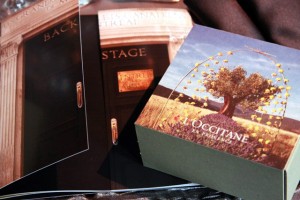
"Backstage" Gala programme
Each year, Les Grands Ballets Canadiens de Montréal, one of the jewels of Montreal’s artistic and cultural heritage, organizes its Benefit Gala, an important fundraising event that has enjoyed strong support from the corporate community over the years. 2009 was no exception. We learned that evening that Les Grands Ballets Canadiens was able to attain successfully its financial goal of $520,000 to fund the dance institution’s creations. Pomerleau Construction and the De Gaspé Beaubien Foundation have each donated $50,000, and other corporate companies, including BMO Bank of Montreal, Britton Electric Company, Sun Life Financial, the, Interinvest Consulting Corporation of Canada, and Power Corporation have each contributed $25,000.
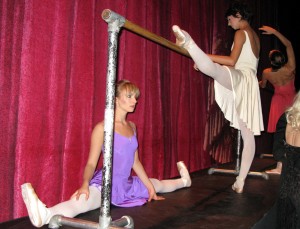
Dancers at the barre
The gala festivities began with a cocktail reception, and the setting was marked with a “backstage” ambiance. On one side of the cocktail reception area, professional makeup artists were busy working on the faces of several female dancers at the M.A.C. Cosmetics makeup station, while other female dancers were exhibiting warm-up barre movements on an elevated stage set behind the cocktail bar located in the middle of the room. It was a prelude to what was to be presented later that evening.
I enjoyed some wonderful wine tasting moments at this special event. During cocktails, I savoured a lovely glass of the 2003 Cuvé J. M. Monmousseau sparkling wine from the Touraine region of the Loire Valley. It was fresh, lively, and simply enjoyable. A welcoming and festive start to the evening.
And of course, an assortment of canapés and hors d’œuvres were making the rounds during the cocktail reception. All the bite-sized delicacies, including the gourmet dinner that evening, were prepared and served by the Vincent Lafleur Traiteur team. Standouts included a delicious fried battered shrimp atop a shooter glass filled with green asparagus velouté; a delectable creamy scallop served in an Asian spoon; a delightful piece of pork-shank rillette enveloped in a light, crisp phyllo pastry; and one of the classics, a splendid smoked salmon square. Served warm, Lafleur’s signature wrapped-rillette amuse-bouche was lightly perfumed with maple syrup and kissed with a l’Île d’Orléans black currant sauce. As for the smooth and flavourful smoked salmon, which simply melted in your mouth, it was homemade; Lafleur had learned to smoke salmon skillfully from his mentor, the great chef James MacGuire, who has been known to always craft his culinary creations masterfully from scratch.
The food and wine, the latter, courtesy of the SAQ, were an integrated part of the gala event, but the spotlight and highlight of the evening were, of course, the Grands Ballets Canadiens de Montréal.
At the gala, we had the honour of seeing a fabulous presentation of excerpts from the contemporary work “Minus One” by the audacious Israeli choreographer Ohad Naharin, an œuvre which was created exclusively for the Montreal dance company in 2002. The entire masterpiece, which combines singing, dancing, cabaret, and audience interaction, represents a floating collage of excerpts drawn from seven of Naharin’s earlier dances, namely, “Zachacha,” “Sabotage Baby,” “Black Milk,” “Passomezzo,” “Anaphaza,” “Queens of Golub,” and “Mabul.” The words that open Naharin’s seamless seven-part programme sum up the choreographic work:
“The illusion of beauty
and a fine line that separates madness from sanity
the panic behind the laughter
and the coexistence of fatigue and elegance”
Mixing dramatic solemnity with light-hearted silliness, this episodic, post-modern theatrical work displays raw energy, physical daring, rich musicality, and sensuous humanity which represent the hallmarks of Ohad Naharin.
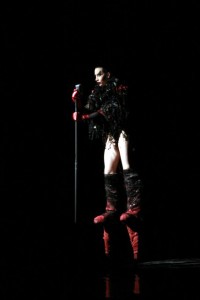
"Sabotage Baby" excerpt from "Minus One"
The illusion of beauty and the element of surprise and nonconformity were already present in the opening segment of the evening performance. In the “Diva” number, an excerpt from “Sabotage Baby,” the dancer, wearing extreme makeup and a provocatively cabaret-style attire, strutted on stage in tall, red velour boot stilts, and, grabbing the microphone, lip-synched melodramatically to a recording of Gopher Mambo by Yma Sumac. The theatrical piece was amusing but divine at the same time.
In another section, a segment extracted from “Zachacha,” the play of nonconformity against uniformity continued to be explored. The ensemble of dancers appeared uniform as they were dressed in outfits of white shirts, black suits, and black fedoras and moved together as an entity. Here, Naharin’s choreography provides the members the opportunity to dance en masse in unison as if they share the same heartbeat, but his work also allows the individuality of each dancer to shine distinctively when given the chance. During the “confessional” ensemble number, selected dancers, one at a time, broke away from the group and performed a brief solo which was accompanied by their own recorded autobiographical story—their personal thoughts about themselves—and then returned to the ensemble as another heretical dancer stepped out to begin. Naharin’s choreographic statements expose the dancers as real people, and they dance for different reasons and in their different, idiosyncratic, and perhaps quirky, ways.
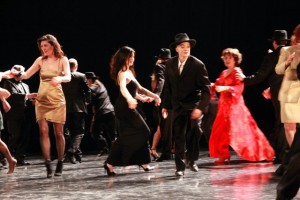
"Zachacha" excerpt from "Minus One": onstage with Les Grands Ballets Canadiens de Montréal
Naharin’s work succeeds at engaging the audience, and the ensuing “Zachacha” sequence literally reached out to the audience. In this fragment, the cast broke down the illusional barrier between audience and performer as the dancers descended from the stage and roamed through the grand room, each inviting an audience member to join them on stage as their partner to perform an impromptu dance medley. Along with the other drafted audience members, I found myself incorporated into the framework of the dance act. My partner, Maria Paulino, from time to time, would lead me around stage, dance with me and around me, twirl me and sway me. There were unpredicted twists and turns, literally and figuratively, in this semi-improvisatory segment, and the element of the unexpected made the final piece a clever and witty one, a fun number for everyone, for the audience members, both onstage and offstage, and for the dance company performers.
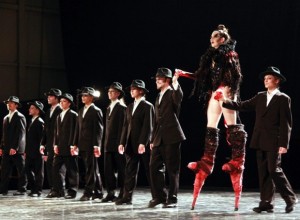
Les Grands Ballets Canadiens de Montréal cast of "Minus One"
At the end of the riveting performance, the audience gave the Grands Ballets Canadiens a well-deserved standing ovation. The athletic and expressive dancers are truly talented and versatile, and in these excerpts, they delivered with technical prowess, polished finesse, natural sensitivity, and exuberant musicality. Having achieved worldwide success with “Minus One,” the dance company will perform the work in its entirety during the upcoming season at Place des Arts in May 2010.
After the dance presentation, we gradually turned our attention to the food. Similar to Naharin’s work, the gala dinner menu created by the catering team was edgy and imaginative in character and construction. Although the three-course dinner was rather uneven, the entire meal, overall, turned out to be quite pleasurable due to the remarkably harmonious and balanced food and wine pairings in the alluring menu.
We began the meal with a chilled appetizer described as “verrine sur anneau de glace,” and its plate presentation merits mention here. Composed of a layering of snow crab fondant, avocado cream, morsels of homemade salmon tartare, and a delightful salad of thinly sliced cucumbers marinated in sweetened vinegar, the starter was served in a shooter glass centred on a large, wide rimmed, round white plate, and the glass base was encircled by a dense ring of ice. Although we all found the evocative description and the artistic presentation of the appetizer enchanting, not everyone enjoyed thoroughly the various flavours of the combined seafood and vegetable dish. The first course, however, was gracefully paired with a glass of white wine, another wine from the Loire region, this time the 2006 Comte Lafond, a Sauvignon Blanc from the Sancerre appellation produced by Baron de Ladoucette.
In contrast to the delicate and subtle flavours of the starter, the main course was ambitious in taste and again, did not appeal to everyone’s palate. The “trilogie de canard,” served in a pool of an orange sauce, comprised an excessively fatty duck breast marinated in citrus fruit and honey, a small and rather unexciting duck gâteau, and a tender duck leg confit, the best of the trio. Accompanied with fresh raspberries, basil, and a selection of root vegetables skewered on a brochette, the three duck pieces were arranged atop of a round slice of cooked grapefruit, including peel and pith (pronouncedly bitter), which was covered with a blanket of sweet potato purée. The accompanying powerful red wine, the 2005 La Sonate Terra Burdigala from the Saint-Emilion grand cru appellation, was extremely enjoyable with its lovely depth and structure; it was a superb match for the dish, but it was not everyone’s cup of tea, or rather, glass of wine.
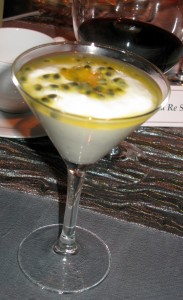
Passion fruit mousse
However, the sweets that followed made up for the missteps. Served in a martini glass, the passion fruit mousse dessert was marvellous; the sweet flavour was nicely offset by the tartness of the passion fruit seeds which garnished generously the light, fluffy mousse. Again, the selected dessert wine complemented wondrously the dish. Elegantly smooth and sweet, the 2007 Domaine Lafrance cidre de glace charmed us immensely with its apple compote aromas and raw sugar and dried apricot flavours. And who could forget about the post-dessert dark chocolate ganache truffles! Made with pure Amadei de Toscane chocolate, the handmade treats were enrobed with a thin shell of hard chocolate coated liberally with cocoa powder. Extremely exquisite and richly decadent. With these sweet delicacies, we relished each bite and sip, and the meal ended on a high and sensual note.
The gala festivities continued to the sounds of Nancy Martinez’s band and the group Alter Ego, who were keeping partygoers occupied on the dance floor. It was a night of celebration, recognition, appreciation, and hope. Art is universal and fundamentally human, so let’s continue to embrace and support the arts.
Tags: "Minus One", ballet, Benefit Gala, caterer, choreography, dance, Les Grands Ballets Canadiens de Montréal, Montreal, Ohad Naharin, Vincent Lafleur Traiteur
